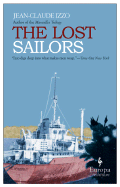
If Joseph Conrad had written a novel with Albert Camus, it would have been something like The Lost Sailors. Yes, it's that good.
The freighter Aldebaran is stranded in Marseilles and up for sale. The owner has disappeared. Abdul Aziz, the Lebanese captain, and Diamantes, the Greek first mate, realize that during 10 years of working together as a perfect team they've never really trusted each other enough to reveal their private lives. But when a sailor opens up and confides in someone, he's lost. These two lost sailors and their troubled attempt at friendship serve as the spine for this superbly-written waterfront noir, which plays out like a classic black-and-white French movie, moody and character-driven, romantic and doomed.
Diamantes is a sailor like his father before him, with a passionate love of maps and sea lore, trying to forget the girl he left behind. Abdul Aziz, the tortured captain he serves, desperately needs someone to talk to--his marriage is crumbling, he's losing the woman he adores, and all he can do is sternly cling to the rules of the ship that will be his last command. One other crew member hasn't left the grounded ship--Nedim, the Turkish sailor boy looking for love who always stumbles into trouble. Along with trouble he also finds Amina, the beautiful girl with the mysterious scar under her eye, abandoned by a sailor long ago and jealously guarded by Ricardo, kingpin of the Marseilles underworld. Every character is sympathetic, every character has a past and a point of view, as they battle for what they love and what they think is right in a tragic, headlong collision that spans generations and sweeps innocent and guilty alike toward violence.
Jean-Claude Izzo, who passed away half a dozen years ago, is a master in the classic French tradition. With concise, confident prose filled with silences and understatement, he creates a realistic world of shipyard toughs and bargirls, freighters and sailors that he seems to know intimately. Not only does he effortlessly create the rich, textured feel of a literary crime thriller, Izzo is a philosopher who never misses an opportunity to comment on the stark realities of the plot. "The real questions are the ones you only ask yourself later. When you've already screwed up your life."
Throughout this rich, wonderful novel Marseilles is omnipresent, teeming with life, radiant and complex as a character, the city Izzo passionately loved, the city where he lived and died.--Nick DiMartino

